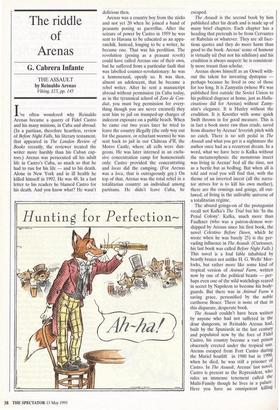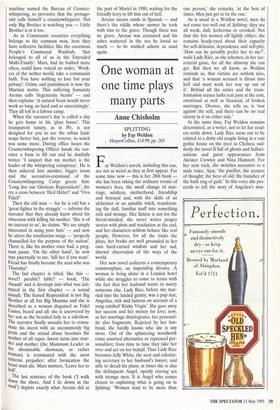The riddle of Arenas
G. Cabrera Infante
THE ASSAULT by Reinaldo Arenas Viking, £15, pp. 145 I've often wondered why Reinaldo Arenas became a quarry of Fidel Castro and his many minions, in Cuba and abroad. (In a partisan, therefore heartless, review of Before Night Falls, his literary testament, that appeared in The London Review of Books recently, the reviewer treated the writer more harshly than his Cuban cap- tors.) Arenas was persecuted all his adult life in Castro's Cuba, so much so that he had to run for his life — and to his death. Alone in New York and in ill health he killed himself in 1992. He was 48. In a last letter to his readers he blamed Castro for his death. And you know what? He wasn't delirious then. Arenas was a country boy from the sticks and not yet 20 when he joined a band of peasants posing as guerrillas. After the seizure of power by Castro in 1959 he was sent to Havana to be educated as an appa- ratchik. Instead, longing to be a writer, he became one. That was his perdition. The revolution (posing as a peasant revolt) could have called Arenas one of their own, but he suffered from a particular fault that was labelled counter-revolutionary: he was a homosexual, openly so. It was then, almost an adolescent, that he became a rebel writer. After he sent a manuscript abroad without permission (in Cuba today, as in the tyrannical school of Zero de Con- duit, you must beg permission for every- thing though you are never excused) they sent him to jail on trumped-up charges of indecent exposure on a public beach. When he came out two years later he tried to leave the country illegally (the only way out for the gusanos, or reluctant worms) he was sent back to jail in our Château d'If, the Morro Castle, where all cells were dun- geons. He was later interned in an exclu- sive concentration camp for homosexuals only: Castro provided the concentrating and locas did the camping. (For Arenas was a loca, that is outrageously gay.) On top of that, Arenas was the total rebel in a totalitarian country: an individual among partisans. He didn't leave Cuba, he escaped. The Assault is the second book by him published after his death and is made up of many brief chapters. Each chapter has a heading that pretends to be from Cervantes or Rabelais or whatever. They are all face- tious quotes and they do more harm than good to the book. Arenas' sense of humour is virtually nil (but not his nihilism) and his erudition is always suspect: he is consistent- ly more truant than scholar.
Arenas shows himself as an Orwell with- out the talent for inventing dystopias perhaps because he lived in one of those for too long. It is Zamyatin (whose We was published first outside the Soviet Union to his political disgrace at home, just as Hallu- cinations did for Arenas) without Zamy- atin's elegance. It is Huxley without the erudition. It is Koestler with some quick Swift thrown in for good measure. This is in fact a book more raw than crude, saved from disaster by Arenas' feverish pitch with no catch. There is no soft pedal in The Assault and what you get is a nightmare the author once had as a recurrent dream. In a word, what we have here is Kafka without the metamorphosis: the monstrous insect was living in Arenas' bed all the time, not as a beetle but as bedbug. But when all is told and read you will find that, with the theme of an inverted incest (all the narra- tor strives for is to kill his own mother), there are the comings and goings, all out- lawed, of living in the unlivable universe of a totalitarian regime. The absurd goings-on of the protagonist recall not Kafka's The Trial but his 'In the Penal Colony'. Kafka, much more than Faulkner (who was a patron-demon wor- shipped by Arenas since his first book, the novel Celestino Before Dawn, which he wrote when he was barely 25) is the per- vading influence in The Assault. (Curiouser, his last book was called Before Night Falls.) This novel is a foul fable inhabited by beastly brutes not unlike H. G. Wells' Mor- locks, but rather more like some kind of tropical version of Animal Farm, written now by one of the political beasts — per- haps even one of the wild watchdogs reared in secret by Napoleon to become his body- guards. But there was in Animal Farm a saving grace, personified by the noble carthorse Boxer. There is none of that in this disparate, desperate book. The Assault couldn't have been written by anyone who had not suffered in the dour dungeons, as Reinaldo Arenas had, built by the Spaniards in the last century and populated now by the foes of Fidel Castro, his country become a vast prison obscenely erected under the tropical sun. Arenas escaped from Fort Castro during the Mariel boatlift in 1980 but in 1990, when he died, he was still a prisoner of Castro. In The Assault, Arenas' last novel, Castro is present as the Represident, who rules an immense tenement called the Multi-Family though he lives in a palace. Here you have an omnipotent killing machine named the Bureau of Counter- whispering, so pervasive that the protago- nist calls himself a counterwhisperer. Not only Big Brother is watching you — Little Brother is at it too.
As in Communist countries everything belongs to the common man, here they have collective facilities, like the enormous People's Communal Washtub, 'that belonged to all of us in the Extended Multi-Family'. Marx, had he bathed more often, could have voiced an order, 'Work- ers of the nether world, take a communist bath. You have nothing to lose but your privacy'. Grime and punishment is now the Mandan motto. This suffering humanity Arenas calls 'degenerate beasts' — and then explains: 'A natural beast would never work so long, so hard and so unresistingly'. They all toil in a labour camp.
When the narrator's day is called a day he gets home to his 'glass house'. This transparent luxury, as in We, is not designed for you to see the urban land- scape better but, just the reverse, to watch you some more. During office hours the Counterwhispering Officer hands the nar- rator a form to fill out and he dutifully writes: 'I suspect that my mother is the leader of the whispering conspiracy'. He is then ushered into another, bigger room and the second-in-command of the Counterwhispering Corps greets him: `Long live our Glorious Represident!', the cry a cross between 'Heil Hitler!' and 'Viva Fidel!'
Then the old man — for he is old but a `great fighter in the struggle' — informs the narrator that they already knew about his obsession with killing his mother. 'She is of no interest to us', he claims. 'We are simply interested in using your hate' — and now he utters the totalitarian usage — 'properly channelled for the purpose of the nation'. There is, like his mother once had, a preg- nant pause. 'On the other hand', he now says paternally to me, 'kill her if you want'. Freud has finally become the man who was Thursday!
The last chapter is titled, like this novel? parable? fable? — book, 'The Assault' and it develops into what was inti- mated in the first chapter — a sexual assault. The feared Represident is not Big Brother at all but Big Mamma and she is described as a woman disguised as Fidel Castro, beard and all: she is uncovered by her son as the bearded lady in a sideshow. The narrator finally assaults her to consu- mate his incest with an uncommonly big Penis and the sexual abuse becomes the mother of all rapes. Incest turns into mur- der and mother (the Maximum Leader as the abominable showman, or rather Woman) is terminated with the most beast prejudice: after fornication the beast must die. Marx mutters, 'Leave her to hell'.
The last sentence of the book CI walk clown the shore. And I lie down in the sand') depicts exactly what Arenas did at the port of Mariel in 1980, waiting for the friendly ferry to lift him out of hell.
Arenas means sands in Spanish — and there's the riddle whose answer he took with him to the grave. Though there was no grave. Arenas was cremated and his ashes scattered in the sea he loved so much — to be washed ashore as sand again.



































































 Previous page
Previous page